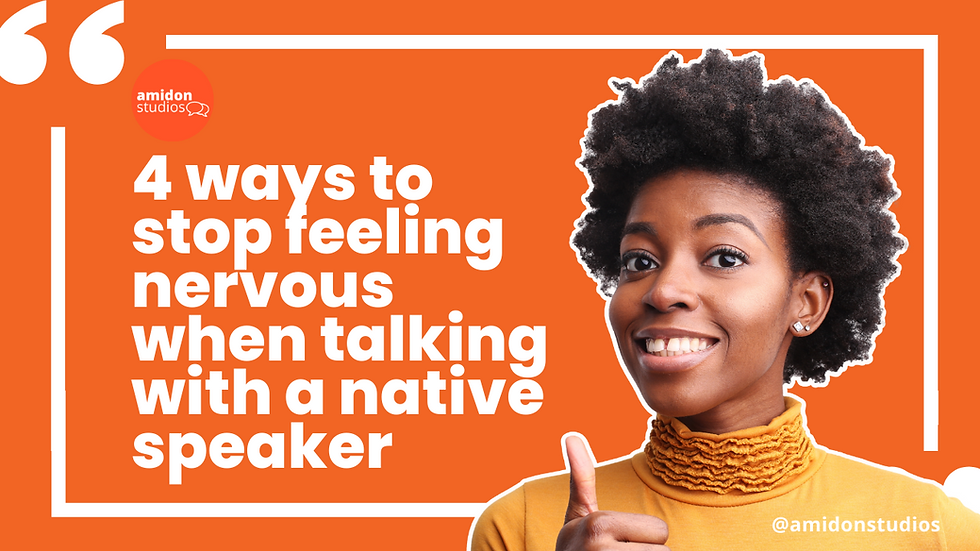Why you're not fluent yet
- Jackie Amidon Donaldson

- Jun 11, 2022
- 4 min read
Try as we might, we don't just become fluent in Spanish, English, or Italian overnight by osmosis. Here are six reasons why you may be struggling with fluency.

In addition to breaking down these six reasons, I'll share with you ways how to correct your path so you can work towards becoming fluent in your target language starting today.
1. You're not practicing consistently
Do you work on the homework your teacher assigns you throughout the week or do you rush to complete it 20 minutes before class starts?
If you're waiting until the last minute, set aside 10 minutes a day to work on homework, and review what you've learned.
Or even just chat with someone in your target language using what you've learned in class, your app, or wherever.
2. You're not using every opportunity to speak and listen
The keys to fluency in your target language are speaking, listening, reading and writing. If we don't seek out chances to use what we're learned, then our fluency skills will be sorely lacking.
I've mentioned several times before ways that you can improve your listening comprehension by listening to a podcast or the news and watching shows and movies using subtitles.
To improve reading, pick out a book or news site you enjoy. Write down any new vocabulary, grammar, or expressions you find. Then look them up using Linguee.
To improve your writing, write a message to someone you know who's fluent in your target language. Or send a message to a person or business you follow on social media giving them feedback about something you enjoyed (or even hated).
Making a new friend in your target language is another useful way to increase both all your fluency skills. You can chat with them online (that's reading and writing) and chat with them in person (listening and speaking).
3. You're not reviewing what you've learned
I had a student who reviewed all the time. She would tell me that her husband would find her asleep with her book open.
But in class, when I asked her questions about what we had reviewed the week before, especially specific areas that she was having the most trouble with, she would just look at me blankly.
This happened time and time again. She was so busy focusing on reviewing everything, even the parts that she excelled at, that she could never remember the areas that she was consistently having the most trouble with.
This was not her best use of time reviewing. It's nice to review everything, but we can only remember so much. Instead, we need to review what we're having trouble with the most.
Stick to reviewing what you don't remember. If your teacher has some recommendations for what you need to work on, focus on those parts.
Your teacher is your guide and truly knows what you need help with. Trust her.
And if you don't review at all, even the sections that your teacher has recommended, then start. Take 10 minutes a day to review what you've learned. I promise it will make all the difference in your fluency level.
4. You're not applying what you've learned in real life
So you're reviewing, going to classes, listening to a podcast, and watching TV shows all in your target language. That's all great, but unfortunately, it's completely one-sided.
You're receiving the information, but you're not actually putting yourself out there and applying it. You have to use what you've learned in the real world.
You have to try speaking with someone in your target language. You have to try messaging someone in your target language.
You have to try ordering food or asking questions at the market in your target language.
And then follow up with more questions. Or reply to what questions the speaker asks you.
5. You don't feel confident enough yet
This is the perfectionist in you blocking your path towards fluency. Low confidence is a bigger picture issue within ourselves. We have the vocabulary, we have the grammar, at least enough to have some basic conversation. But it's usually about wanting to be perfect.
There are people out there who just start speaking even if they're completely wrong. You know what sets them apart? They just don't care if they're wrong. They want too much to share what they're thinking or have a chat with someone to care if their vocabulary is right.
They know that speaking and listening mean a certain level of give and take has to happen. They have faith that the person they're speaking with will try their best to help them understand.
Having faith that you know more than you think you know is key. So is having faith that the other speaker is going to help you out.
Focus less on your fears and more on your desire to be heard and make a connection.
If any of those challenges that I just listed sound familiar, keep reading.
How I can help

I can help you become fluent in Spanish, English, and Italian by:
👉 Coming up with a study plan
👉 Providing full immersion
👉 Boosting your confidence
👉 Putting into practice what you learn
👉 Finding you opportunities to chat with native speakers
Message me to get started! 💥

Jackie Donaldson is the owner and director of Amidon Studios Language Studies. She started Amidon Studios in 2017 after managing a language institute in Lima, Peru. She's taught students from all over the world while living in Peru, Mexico, and the U.S. When she's not working or studying, you'll find her gardening, playing with her cat Frankie, swimming, baking, and exploring the globe.




Comments